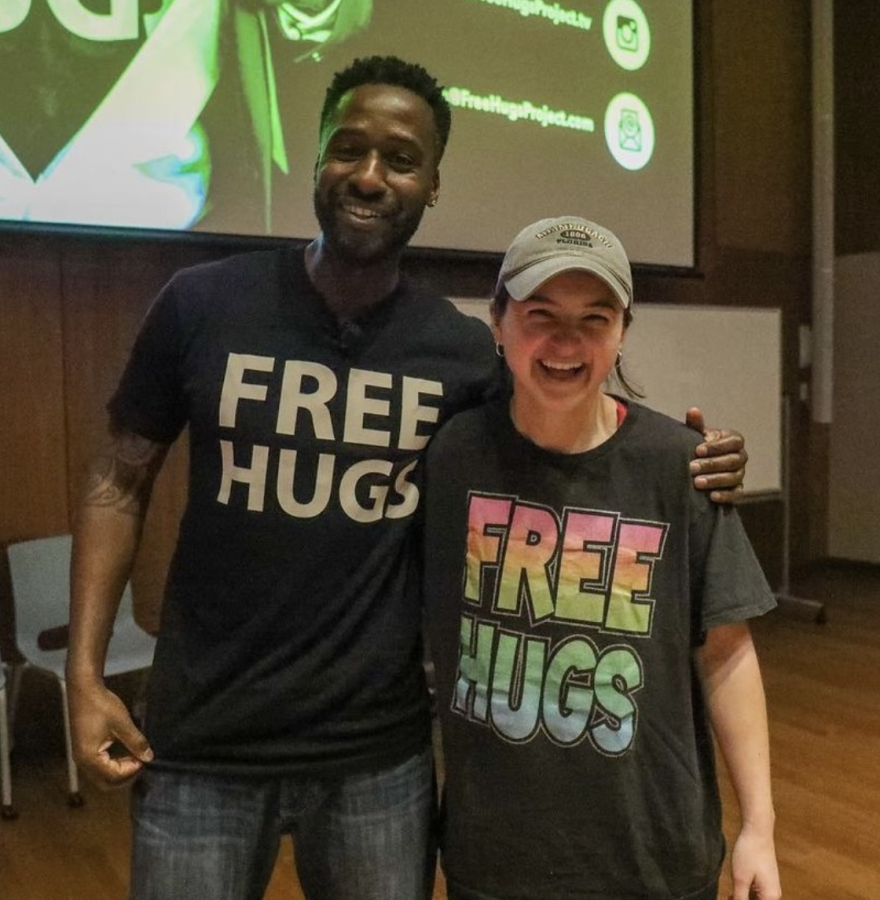The power of positivity, a passion for justice, and free hugs
Courtesy / Saint Anselm College
Ken Nwadike and Chloe Lodoño-Ayr ’23 sport ‘Free Hugs’ t-shirts.
February 23, 2023
In his Feb. 16 talk at Saint Anselm, Ken Nwadike, motivational speaker and peace activist, recalled a key moment from his childhood that continues to shape his life’s work. Wearing a black shirt with the words “Free Hugs” on it, Nwadike gave a compelling presentation, titled “The Power of Positive Interaction,” on his life story and social justice mission. And, yes, he gave out free hugs.
That formative memory was a conversation with Nwadike’s mother during the 1992 riots in Los Angeles after the acquittal of police officers charged with the beating of Rodney King. His mom explained to him that the riots had begun because of “injustice to a man named King. Let me tell you about another man named King.”
That second King, of course, was Martin Luther King Jr., and Nwadike carries on King’s legacy of nonviolent social activism through his work with the Free Hugs Project. His role as a peace activist involves traveling to riots and protests to de-escalate violence. While working with law enforcement and local authorities, Nwadike works to build connections between protestors and law enforcement officers with the goal of reducing violence.
Nwadike shared videos of his job as a peace activist, physically putting himself into public conflicts across the country and listening intently to the words of angry protesters in one-on-one conversation. The videos also showed Nwadike dancing, hugging people, and holding a sign declaring “Love is Power.”
Nwadike expressed a “deep distrust” of police rooted in his first police encounter at the age of nine, when his family’s house was surrounded by police officers and his father was arrested. From there, Nwadike lived in a homeless shelter in Los Angeles with his mother and siblings.
An encounter with his high school’s track coach Nwadike’s junior year of high school changed the trajectory of his life. Nwadike joined the track team, ran his first mile in 4 minutes 17 seconds at a track meet, and not only became the third fastest miler in California but found a newfound sense of community. He describes the track team as the “first time I felt this sense of belonging.”
Nwadike described news coverage, college scouts, a professional contract with Nike, and other public recognition of his abilities. He also said that the kids from the homeless shelter where he grew up and continued to stay involved just “didn’t get it,” because they had never seen someone from their background succeed.
That sense of belonging Nwadike felt when he started running and his deep desire to be a role model for the kids inspired him to plan a half marathon with the kids to raise money for the shelter and show them that they, too, could achieve success. Nwadike’s grand plan to shut down Hollywood Boulevard for the half marathon succeeded against the odds.
During a debrief of the Hollywood Half Marathon with the LAPD, the 2013 Boston marathon bombing occurred. Nwadike described the visceral experience of watching this while at a meeting to discuss a race that he had organized. Running had given him everything, he said, so “when you bomb it or attack it, it feels like you’re directly attacking something that changed my life.”
Obviously this changed everything for future Hollywood Half Marathons. Instead, Nwadike got future Hollywood runners (himself included) to pledge to run in next year’s Boston marathon. But Nwadike failed by just a few seconds to qualify to run in the marathon.
No matter what,, Nwadike decided to go to Boston anyway, wanted to model for the kids what it means to follow through on something“follow through” for the kids. He printed “Free Hugs” on a T-shirt and decided to “fly across the country to hopefully hug people who probably won’t hug me back.”
Runners did hug him back, however. A video clip showed several runners stopping to hug the guy whose shirt said FREE HUGS. One woman even said, “That must have been the first hug I’ve had in three years,” as she ran away.
The video went viral during Nwadike’s six-hour plane ride back to LA. While the kids at the homeless shelter hadn’t believed that anyone would actually hug Nwadike, their response after seeing the video was, “You gotta keep it up. People can finally see us now.”
Nwadike kept it up. He realized just how one thing after another had to happen in his life in order for him to be “walking in his calling” today. “Now it all makes sense,” he says. He gets to connect with and inspire young people on a weekly basis in his job as a motivational speaker, and encourages people to create “civility in the midst of chaos” in his work as a peace activist.
As Nwadike said, “If Dr. King were here, he would be working to serve the community.” Serving his community, going where people are hurt and broken, and trying to get people to “see the humanity” in others are passions that shape all of Nwadike’s work.
Nwadike challenged his Feb. 16th audience, “Imagine if we all took steps to change what doesn’t sit right with us.” He encouraged listeners to think about what really mattered to them and what they could do about it. Even if it’s “something as simple as words on a T-shirt.”



